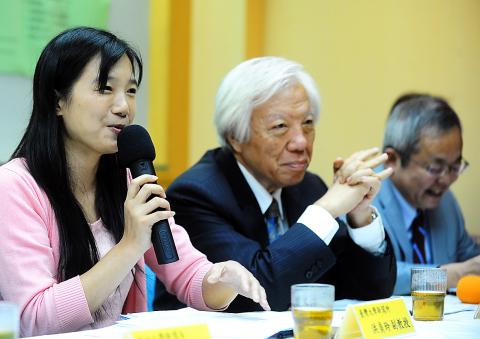Fearing the approval of an application by Want Want China Times Group to purchase China Network Systems would turn the former into a “media monster” monopoly, academics held a press conference yesterday to urge the National Communications Commission (NCC) to block the acquisition.
On the eve of the second public hearing for the merger review today, academics said an Internet petition against the merger initiated by 54 academics had received the support of 78 civic groups and 2,136 individuals over six days.
Want Want China Broadband already has major newspapers, magazines, publishing firms and cable and wireless TV news channels, National Taiwan University associate professor Hung Chen-ling (洪貞玲) said, adding that if the merger with CNS was approved, a multiple system operator that operates 11 cable TV and broadband Internet services would account for about 30 percent of the total media audience in Taiwan.

Photo: Wang Yi-sung, Taipei Times
Hung said academics feared the NT$70 billion (US$2.3 billion) merger attempt by the group — which has a track record of “bad behavior” for accusing NCC commissioners in its newspaper and filing suits on reporters — risked leading to high media concentration, harming freedom of the press.
Shih Jun-ji (施俊吉), a research fellow at Academia Sinica’s Institute of Social Science, said it made no sense to continue the review when three of the seven review committee members had already walked out.
“With only four members left, the committee is not competent to review this important case,” Shih said.
The academics urged the commission to stop the review process and establish an ad hoc committee including citizen representatives and specialists from various fields to investigate the case.
Hu Yuan-hui (胡元輝), an associate professor at National Chung Cheng University’s department of communications and president of the Foundation for Excellent Journalism, said that many studies showed that high media concentration undermines the quality of the media environment, not only in terms of lack of content diversity but also independence and the labor conditions of journalists.
Lin Yuan-huei (林元輝), a professor at National Chengchi University’s department of journalism, said studies have shown that the China Times has provided much more entertainment news about Want Want group’s cable channels since the last merger.
The academics said they also feared that with a large proportion of Want Want Group chairman Tsai Eng-ming’s (蔡衍明) profits being made in China, there was reason to suspect that messages favorable toward the Chinese government would affect media content in Taiwan.
“Having control over the channels also means control over their content,” Shih said, adding that the merger could affect as many as 4 million viewers if it were allowed to proceed.
Some academics also expressed support for the media to monitor government officials and political figures to protect the public interest. They criticized Chinese Nationalist Party (KMT) caucus whip Hsieh Kuo-liang’s (謝國樑) lawsuit against Internet news source New Talk reporter Lin Chau-yi (林朝億) for reporting that Hsieh had tried to pressure the commission into approving the merger.
Association of Taiwan Journalists executive committee member Liu Ming-tang (劉明堂) said it was improper for legislators to file lawsuits against ordinary citizens to express their discontent.

Alain Robert, known as the "French Spider-Man," praised Alex Honnold as exceptionally well-prepared after the US climber completed a free solo ascent of Taipei 101 yesterday. Robert said Honnold's ascent of the 508m-tall skyscraper in just more than one-and-a-half hours without using safety ropes or equipment was a remarkable achievement. "This is my life," he said in an interview conducted in French, adding that he liked the feeling of being "on the edge of danger." The 63-year-old Frenchman climbed Taipei 101 using ropes in December 2004, taking about four hours to reach the top. On a one-to-10 scale of difficulty, Robert said Taipei 101

Nipah virus infection is to be officially listed as a category 5 notifiable infectious disease in Taiwan in March, while clinical treatment guidelines are being formulated, the Centers for Disease Control (CDC) said yesterday. With Nipah infections being reported in other countries and considering its relatively high fatality rate, the centers on Jan. 16 announced that it would be listed as a notifiable infectious disease to bolster the nation’s systematic early warning system and increase public awareness, the CDC said. Bangladesh reported four fatal cases last year in separate districts, with three linked to raw date palm sap consumption, CDC Epidemic Intelligence

US climber Alex Honnold left Taiwan this morning a day after completing a free-solo ascent of Taipei 101, a feat that drew cheers from onlookers and gained widespread international attention. Honnold yesterday scaled the 101-story skyscraper without a rope or safety harness. The climb — the highest urban free-solo ascent ever attempted — took just more than 90 minutes and was streamed live on Netflix. It was covered by major international news outlets including CNN, the New York Times, the Guardian and the Wall Street Journal. As Honnold prepared to leave Taiwan today, he attracted a crowd when he and his wife, Sanni,

Two Taiwanese prosecutors were questioned by Chinese security personnel at their hotel during a trip to China’s Henan Province this month, the Mainland Affairs Council (MAC) said yesterday. The officers had personal information on the prosecutors, including “when they were assigned to their posts, their work locations and job titles,” MAC Deputy Minister and spokesman Liang Wen-chieh (梁文傑) said. On top of asking about their agencies and positions, the officers also questioned the prosecutors about the Cross-Strait Joint Crime-Fighting and Judicial Mutual Assistance Agreement, a pact that serves as the framework for Taiwan-China cooperation on combating crime and providing judicial assistance, Liang